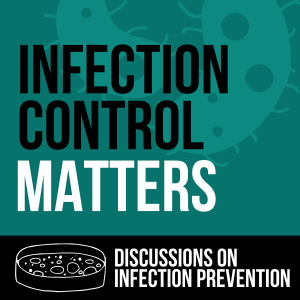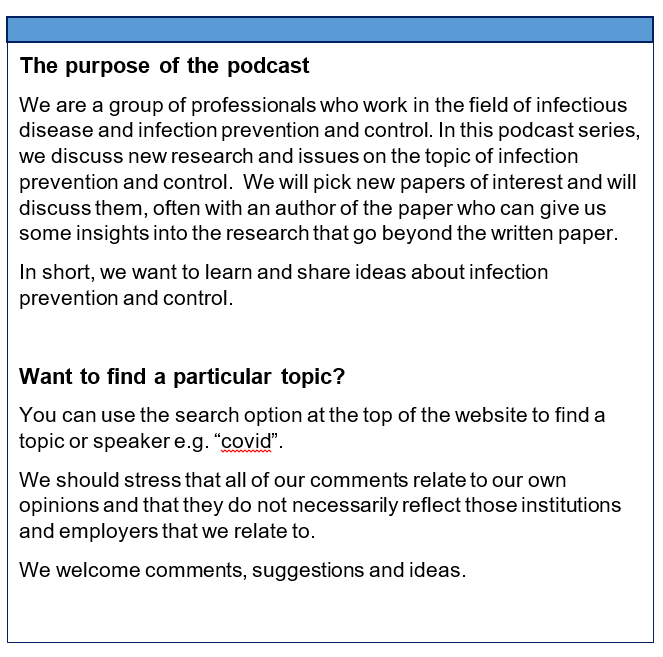Infection Control Matters
We are a group of professionals who work in the field of infectious disease and infection prevention and control. In this podcast series, we discuss new research and issues on the topic of infection prevention and control. We will pick new papers of interest and will discuss them, often with an author of the paper who can give us some insights into the research that go beyond the written paper. Authors will include nurses, doctors, academics, clinicians, administrators and leaders. We should stress that all of our comments relate to our own opinions and that they do not necessarily reflect those institutions and employers that we relate to. We welcome comment, suggestions and ideas. Please consider subscribing for updates and to find collections of topic specific podcasts at www.infectioncontrolmatters.com
Episodes

Thursday Mar 10, 2022
Thursday Mar 10, 2022
In this week's episode, Brett Mitchell and Martin Kiernan use a recent paper published in Infection Control and Hospital Epidemiology to start a discussion about an relationship between IPC Team staffiing levels and levels of healthcare-associated infections. How are staffing levels set and is it just a number or is there more to it? The papers that we discuss are listed below.
1. Clifford RJ, Newhart D, Laguio-Vila MR, Gutowski JL, Bronstein MZ, Lesho EP. Infection preventionist staffing levels and rates of 10 types of healthcare-associated infections: A 9-year ambidirectional observation. Infect Control Hosp Epidemiol. 2022:1-6. doi:10.1017/ice.2021.507
2. Mitchell BG, Hall L, MacBeth D, Gardner A, Halton K. Hospital infection control units: staffing, costs, and priorities. Am J Infect Control. 2015;43:612-6. doi:10.1016/j.ajic.2015.02.016
3. Dickstein Y, Nir-Paz R, Pulcini C, Cookson B, Beovic B, Tacconelli E, et al. Staffing for infectious diseases, clinical microbiology and infection control in hospitals in 2015: results of an ESCMID member survey. Clin Microbiol Infect. 2016;22:812 e9- e17. doi:10.1016/j.cmi.2016.06.014

Wednesday Mar 02, 2022
Wednesday Mar 02, 2022
In this episode, Martin Kiernan talks to Professor Gonzalo Bearman, Chair, Division of Infectious Diseases and Hospital Epidemiologist/Medical Director of VCU Healthcare and the Richard P. Wenzel Professor of Internal Medicine at the Virginia Commonwealth University Health System (full CV here)
Following on from the increase in virtual working due to the pandemic, we discuss the potential for providing healthcare facilities in low and middle income countries with virtual support and consulting. The papers that we discuss are listed here.
1. Jones, T., Marimuthu, K., Bearman, G. Virtual Infection Prevention and Control in Low- and Middle-Income Countries, International Journal of Infectious Diseases,Volume 117, 2022, Pages 93-96, https://doi.org/10.1016/j.ijid.2022.01.065.
2. Anderson, D., Miller, B., Chen, L., Adcock, L., Cook, E., Cromer, A., . . . Sexton, D. (2011). The Network Approach for Prevention of Healthcare-Associated Infections: Long-Term Effect of Participation in the Duke Infection Control Outreach Network. Infection Control & Hospital Epidemiology, 32(4), 315-322. https://doi.org/10.1086/658940
3.Pryor, R., Vokes, R., Anderson, D., & Bearman, G. (2021). Virtual infection prevention—The next frontier. Infection Control & Hospital Epidemiology, 42(11), 1374-1375. https://doi.org/10.1017/ice.2020.1404

Wednesday Feb 23, 2022
Wednesday Feb 23, 2022
In this episode, Brett Mitchell and Martin Kiernan discuss methods of drying hands after hand hygiene has been performed, with a focus on hand dryers versus paper towel. Personal details about Martin's habits are disclosed as we mull this over and present some papers.
Papers presented include:
1. Suen, L. K., Lung, V. Y., Boost, M. V., Au-Yeung, C. H., & Siu, G. K. (2019). Microbiological evaluation of different hand drying methods for removing bacteria from washed hands. Scientific reports, 9(1), 1-7. https://www.nature.com/articles/s41598-019-50239-4
2. Reynolds, K. A., Sexton, J. D., Norman, A., & McClelland, D. J. (2021). Comparison of electric hand dryers and paper towels for hand hygiene: a critical review of the literature. Journal of applied microbiology, 130(1), 25-39. https://pubmed.ncbi.nlm.nih.gov/32794646/
3. Best, E., Parnell, P., Couturier, J., Barbut, F., Le Bozec, A., Arnoldo, L., ... & Wilcox, M. H. (2018). Environmental contamination by bacteria in hospital washrooms according to hand-drying method: a multi-centre study. Journal of Hospital Infection, 100(4), 469-475. https://pubmed.ncbi.nlm.nih.gov/30006281/

Wednesday Feb 16, 2022
Wednesday Feb 16, 2022
The WHO Global Outreach Alert and Response Network (GOARN) is the topic for this podcast. We talk with Dr Peta-Anne Zimmerman about the network, what is does and how to get involved.
Dr Peta-Anne Zimmerman is Senior Lecturer and Program Advisor for the Griffith University and is Board Director of the Australasian College for Infection Prevention and Control. She is also a Senior Faculty and Focal Point for the Global Outbreak Alert and Response Network of the World Health Organization.
The weblink to GOARN for more information is https://extranet.who.int/goarn/

Wednesday Feb 09, 2022
Wednesday Feb 09, 2022
In this episode we return to another ICM favourite topic, healthcare-associated pneumonia that is not device-associated. Martin Kiernan talks to Dr Mark Garvey, Director of Infection Prevention and Helen Woodall, Senior Dental Nurse, both of University Hospitals Birmingham NHS Trust about the 'Mouth Care Matters' initiative. Education of registered nurses and healthcare assistants was a key part of the strategy, which ultimately resulted in a significant reduction in infections.
Note that in England a 'Trust' is an NHS healthcare provider organisation which may be made up of more than one hospital or unit.
The paper outlining the initiative and results can be found here https://www.journalofinfection.com/article/S0163-4453(21)00275-9/fulltext

Wednesday Feb 02, 2022
Wednesday Feb 02, 2022
In this podcast, Brett talks to Adjunct A/Professor Greg Whiteley about adenosine triphosphate (ATP). We chat about its use in healthcare as a way to evaluate environmental cleanliness.
Greg is an Adjunct Associate Professor in the Faculty of Medicine and Health at the University of Sydney, and is also an adjunct Fellow in the School of Medicine at Western Sydney University. Greg is also the Executive Chairman of Whiteley Corporation, a manufacturer of Therapeutic Goods based in the Hunter Region of New South Wales. His particular expertise is in the measurement of cleanliness, particularly based on rapid ATP testing where he is internationally renowned, published and is a regular keynote conference speaker.

Thursday Jan 27, 2022
Thursday Jan 27, 2022
In this, the first episode of 2022, Martin Kiernan talks to Dr Matt Butler, Consultant Geriatrician (Addenbrookes Hospital, Cambridge, UK), Dr Christine Peters, Consultant Microbiologist (NHS Greater Glasgow, Scotland) and Dr Evonne Curran, now an independent IPC Consultant. We start off by discussing how Matt came to design a study that looks at the effect of air filtration on a range of infections, including respiratory viruses and more 'common' pathogens like Clostridium difficile. We also discuss why it had taken so long for airborne transmission to be accepted as a mode of transmission. Books recommended by Evonne in the podcast are listed below.
Think Again: The power of knowing what you don't know by Adam Grant (https://www.adamgrant.net/book/think-again/) ISBN: 9780753553886
Seeing what others don't by Gary Klein ISBN: 9781857886788
Paper by Andrew Conway-Morris referred to in the podcast:
Andrew Conway Morris, Katherine Sharrocks, Rachel Bousfield, Leanne Kermack, Mailis Maes, Ellen Higginson, Sally Forrest, Joana Pereira-Dias, Claire Cormie, Tim Old, Sophie Brooks, Islam Hamed, Alicia Koenig, Andrew Turner, Paul White, R Andres Floto, Gordon Dougan, Effrossyni Gkrania-Klotsas, Theodore Gouliouris, Stephen Baker, Vilas Navapurkar, The Removal of Airborne Severe Acute Respiratory Syndrome Coronavirus 2 (SARS-CoV-2) and Other Microbial Bioaerosols by Air Filtration on Coronavirus Disease 2019 (COVID-19) Surge Units, Clinical Infectious Diseases, 2021;, ciab933, https://doi.org/10.1093/cid/ciab933

Wednesday Dec 15, 2021
Wednesday Dec 15, 2021
In this largely unedited Christmas special podcast, Martin, Phil and Brett reflect on podcasts undertaken in 2021 and the year that was. This podcast is a little longer as we "chinwag" about a range of different topics and issues and have a laugh along the way. We hope you enjoy.

Thursday Dec 09, 2021
Thursday Dec 09, 2021
In this week’s episode, Martin Kiernan talks to Professor Jennie Wilson of the Richard Wells Research Centre at the University of West London and current Infection Prevention Society President. We discuss her recent editorial, co-written with Associate Professor Jacqui Prieto from the University of Southampton. After 25 years of contact precautions, first introduced as putative best practice, the evidence to support this intervention has not appeared and there are suggestions that harms may be being caused through poor implementation. Contact precautions add PPE and physical isolation to Standard Precautions, however does this lead to over, and inappropriate use of PPE that is not required?
Papers cited during the podcast include:
Wilson J, Prieto J. Re-visiting contact precautions – 25 years on. Journal of Infection Prevention. 2021;22:242-4. Doi: 1177/17571774211059988
Bearman G, Abbas S, Masroor N, Sanogo K, Vanhoozer G, Cooper K, et al. Impact of Discontinuing Contact Precautions for Methicillin-Resistant Staphylococcus aureus and Vancomycin-Resistant Enterococcus: An Interrupted Time Series Analysis. Infect Control Hosp Epidemiol. 2018;39:676-82. https://www.ncbi.nlm.nih.gov/pubmed/29580304

Wednesday Dec 01, 2021
Wednesday Dec 01, 2021
In this podcast, Phil and Brett talk to Simon Witts on a wide ranging topics related to ventilation and also touch on air scrubbers (purifiers). Simon is Director of Engineering at VA Science, with extensive experience in hospital and building ventilation design. We cover topics such as air changes, what makes a good ventilation system and hotel quarantine. We also cover practical things like where best to sit on a bus to reduce the risk of infection.

About us and contact
Feel free to contact us with suggestions on topics and or speakers. Use Twitter to contact any one or all of us:
Brett Mitchell @1healthau (Twitter link)
Martin Keirnan @emrsa15 (Twitter link)
Deb Friedman @friedmanndeb
Phil Russo: @PLR_aus (Twitter link)

Martin Kiernan: Martin is a highly experienced nurse who has worked in the field of infection prevention and control since 1990 in the acute hospital community and, more recently, in academic and industry settings with GAMA Healthcare. Martin's reputation as a research collaborator is recognised both nationally and internationally. Martin’s involvement in professional organisations such as the Infection Prevention Society and the Healthcare Infection Society has enhanced his reputation as a key opinion leader, teacher, leader, and researcher. As a result, he has been invited to act in leadership and mentoring roles to support his colleagues throughout the world in terms of infection prevention.

Professor Brett Mitchell: Brett is a Professor of Nursing with over 150 peer reviewed journal and oral conference presentations, authored several books, and has been an invited speaker at numerous infection prevention and control conferences in Australia and internationally. He is a Fellow of the Australasian College for Infection Prevention and Control and the Australian College of Nursing. Professor Mitchell is also Editor-in-Chief of Infection, Disease and Health. Professor Mitchell has experience leading nursing teams, research teams and infection prevention and control teams in both Australia and the United Kingdom. Further details: https://www.newcastle.edu.au/profile/brett-mitchell

Associate Professor Philip Russo: Phil is Director of Research, Nursing and Midwifery, Faculty of Medicine, Nursing and Health Sciences, Monash University, Victoria, Australia and Director of Nursing Research, Cabrini Health. A/Prof. Russo is the Past President of the Australasian College for Infection Prevention and Control. He has worked in both state and national positions, notably leading the establishment of the VICNISS Surveillance Program in Victoria followed by overseeing the successful implementation of the National Hand Hygiene Initiative sponsored by the Australian Commission for Safety and Quality in Health Care. Recently he has been an advisor at both a State and National level in the pandemic response. Further details: https://research.monash.edu/en/persons/philip-russo







